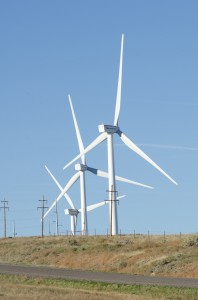2014年9月16日、世界経済気候委員会が「より良い成長、より良い気候」というタイトルのレポートを発表しました。
レポートでは、各国がいかにして「質が高く、危機に対する強靭性があり、包摂的な経済成長」を実現しながら、
気候リスクを減らすことができるかを報告しています。
この委員会は、元首相や財務大臣を含む、有名な国際経済学者らがメンバーとなっています。
7章からなるレポートでは、「気候変動によるかつてないほどの危機」についてとりまとめています。
気候変動は、世界的な経済成長の影響を受けて、化石燃料の使用量が増え、
温室効果ガスが急激に増加したことによって引き起こされたこと、
温室効果ガスの排出がこのまま続けば、21世紀末までに世界平均気温が4度以上上がり、
深刻な社会的危機、経済的危機が起こる可能性があることなどを述べる一方で、
政策決定者たちが新しい成長モデルを作ることによって現在の経済的な問題を乗り越えることはできると断言。
同時に、社会システムと技術に革新をもたらすことで得られる新たなチャンスによって、
気候リスクを抑えることができるともつづっています。
このレポートでは、都市、土地利用(例えば森林伐採と農業)、エネルギーのように、
鍵となるいくつかの分野における変化と機会についても考察されています。
その中で、 電力供給の拡大や重工業の急成長を求める多数の国では、
石炭を選択するのは当然のことのようになっているが、
石炭は化石燃料の中でCO2排出量が最も多く、 温室効果ガスの排出、
大気汚染、健康被害への 甚大なコストが生じているとしています。
世界経済気候委員会は 「石炭がもたらすリスクを考えると、『立証責任』を
逆転させるべき時が来たといえる。 もはや石炭は、常に経済性に優れた選択肢であるとはいえない。」とし、
石炭使用を減らすことは不可欠であるというだけではなく、
「他のエネルギーのコストの変化や健康被害の軽減、 その他の副次的な効果を考えれば、
ゼロあるいは非常に低コストで実現できる」としています。
 一方、同委員会は再生可能エネルギーや ゼロカーボンエネルギーの
一方、同委員会は再生可能エネルギーや ゼロカーボンエネルギーの
可能性を 高く評価し、 各国が、エネルギー戦略や計画、
市場の調整、サポートシステムを通して、
その可能性を実現するよう意欲的に取り組むことを勧告しています。
また、CCS(二酸化炭素回収貯留)と、 低炭素エネルギーまでのつなぎとしての
天然ガスの役割についても論じているほか、 イノベーション、
金融政策、国際協力などを強調し、 低炭素な未来に向けた
新しい経済システムを提示しています。
その中で、石炭火力発電の拡大を抑えることが肝心で、
「先進国は、老朽化した石炭火発を引退させ、
また、新規の石炭火発電は建設するべきではない。」と指摘しました。
同時に、途上国での石炭火発建設は
「よりクリーンなエネルギーを調達するのが、 経済的に難しい」場合に限るべきだとしています。
そして同委員会は、今回の分析に基づいて、10の国際的な行動計画も示しました。
その一つに石炭火発を段階的に廃止することを提示し、
高所得国は、CCSのないむき出しの石炭火発建設をやめることと、
運転中のものは早期に引退させることを今約束すべきだとしています。
また、政府、各国および多国間の開発銀行が、透明性の高い手段のもとで
各エネルギーのすべての費用と便益を精査する、
統合されたエネルギー政策決定を実施するべきだと書いています。
メッセージは明確です。
それは、汚い石炭火力発電から、一刻も早く撤退するということ。
参考
国際経済気候委員会:“より良い成長、より良い気候―新気候経済レポート”、2014年9月。
フルバージョン サマリ
On 16th September 2014, the Global Commission on the Economy and Climate, a team of prominent international economists including former heads of government and finance ministers, released a report titled “Better Growth Better Climate” on how countries can reduce the risks of climate change while achieving ‘high-quality, resilient and inclusive economic growth’.
The seven-chapter document outlines the ‘unprecedented risks posed by climate change’ due to the surge in greenhouse gas (GHG) emissions resulting from global economic growth: emissions it attributes mostly to the growing use of fossil fuels, and which if they continue at current trends, could lead to an increase in global temperature by more than 4°C by the end of the century and serious associated social and economic risks.
However, it asserts that decision-makers can ‘overcome current economic problems and establish new models of growth’, while simultaneously reducing these climate risks due to new opportunities from structural and technological change.
The report considers these changes and opportunities in several key areas, among them cities, land use (such as deforestation and agriculture), and energy.
It identifies coal as the fossil fuel that ‘remains the default option for rapid expansion of the power supply and for heavy industry’ in many countries – this is despite it being the most carbon-intensive fossil fuel and exacting substantial costs in GHG emissions, air pollution, and public health.
The Global Commission thus take the position that ‘given the known risks associated with coal, it is time to reverse the “burden of proof”, so coal is no longer assumed to be an economically sound choice by default’.
It makes the case that reducing its use is not only essential, but can be achieved at ‘zero or very low net cost, once the changing cost of alternatives, and reduced health damages and other co-benefits are taken into account’. 
Conversely the Global Commission promotes the potential of renewable and zero-carbon energy, and recommends that countries ‘raise ambition’ to fulfil that potential through energy strategy, planning and market arrangements, and support systems.
It also discusses carbon capture and storage (CCS), as well as the suggested role of natural gas as a ‘bridge’ to low-carbon energy.
The report goes on to set out an economic framework for change, emphasising innovation, financial policies, and international cooperation towards a low-carbon future.
In these discussions it repeats that it regards it as ‘critical to limit further coal expansion in the power sector’, stating that ‘developed countries need to retire their existing coal plants as they age and not build any new plants’, while developing countries should only build them ‘where cleaner alternatives are not economically viable’.
On the basis of these assessments, the report advances a ten-point global action plan.
It devotes one of these points entirely to phasing out coal-fired power generation, and states that “High-income countries should commit now to end the building of new unabated coal-fired power generation and accelerate early retirement of existing unabated capacity”.
In addition it recommends that “governments and multilateral and national development banks should adopt an integrated framework for energy decisions, ensuring a public and transparent consideration of all the costs and benefits of different energy sources”.
The message is clear enough: accelerate the shift away from polluting coal-fired power generation.
Sources:
The Global Commission on the Economy and Climate
‘Better Growth Better Climate – The New Climate Economy Report’, September 2014 Full report Online summary

